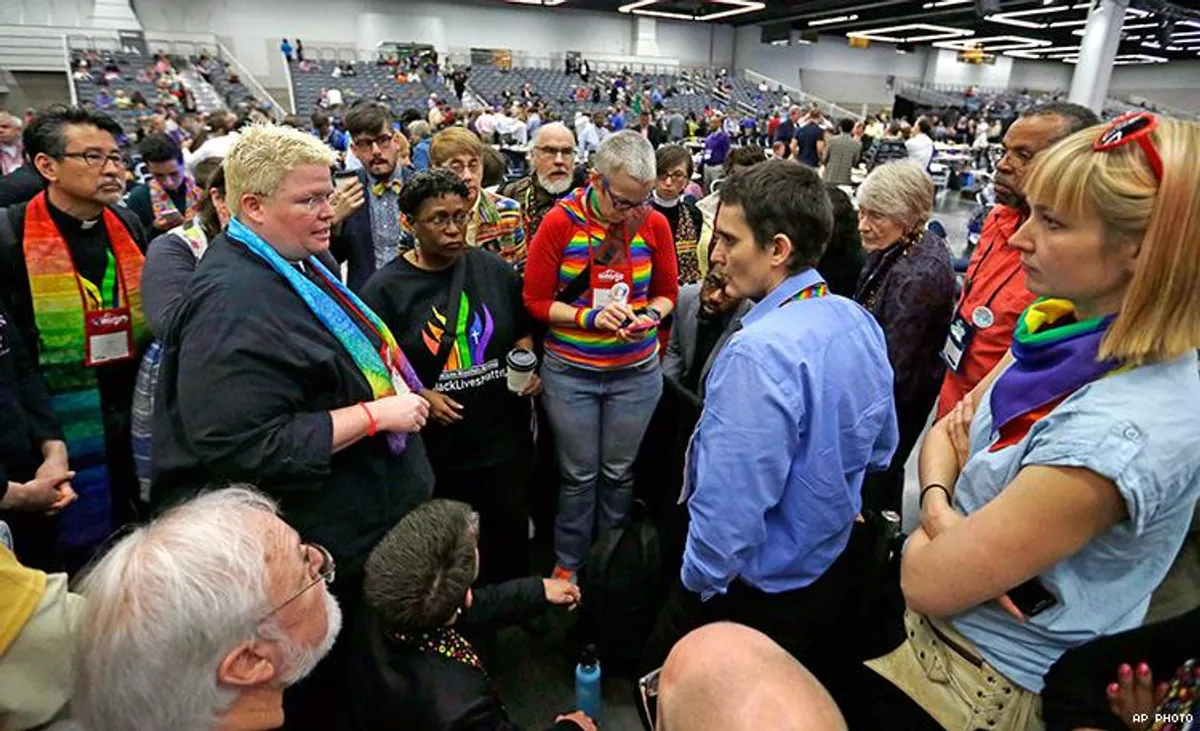Religion
Is Methodist Punt on LGBT Issues a Positive Move?

Some activists feel hopeful in light of a decision to set up a special commission to study issues of sexuality.
May 19 2016 12:14 PM EST
May 19 2016 12:14 PM EST
trudestress
By continuing to use our site, you agree to our Private Policy and Terms of Use.

Some activists feel hopeful in light of a decision to set up a special commission to study issues of sexuality.
The United Methodist Church hasn't ended anti-LGBT discrimination, but it's taken what some activists see as a major step in that direction.
Delegates to the church's General Conference voted Wednesday to defer any debate on matters of sexuality and let a special commission study the issue and make recommendations.
The denomination doesn't currently ordain openly LGBT clergy or bless same-sex marriages, and it considers "the practice of homosexuality" to be "incompatible with Christian teaching," as stated in its Book of Discipline. For several years activists within the church have tried to change these policies, and some congregations and clergy members defy them. And there are certainly LGBT Methodist clergy members, many of whom have come out.
Pro-equality Methodists had hoped for a vote on LGBT issues at the conference, currently going on in Portland, Ore. But the Council of Bishops recommended the deferral, and delegates accepted it, reports the United Methodist News Service.
"We accept our role as spiritual leaders to lead the United Methodist Church in a 'pause for prayer' -- to step back from attempts at legislative solutions and to intentionally seek God's will for the future," Council of Bishops president Bishop Bruce Ough said in making the recommendation, according to the news service.
The General Conference meeting is held every four years, but if the commission has recommendations ready before the next one, set for 2020, the church may call a special conference, perhaps in 2018 or 2019, the news service notes.
The action is positive for several reasons, according to the Reconciling Ministries Network, a group of pro-LGBT Methodist congregations advocating for equality within the church.
For one, "it prohibits any legislative action that would further harm LGBTQ people and threaten the cause of justice," says an online statement signed by Rev. Dr. Pamela Lightsey, a member of the Reconciling Ministries Network board of directors, and Matt Berryman, the group's executive director.
Also, the bishops have committed to avoiding church trials for defying anti-LGBT policies while the commission does its work, and Ough has promised that the commission will include LGBT members, Lightsey and Berryman said in the statement.
"Some people feel like this is nothing, that nothing was accomplished yesterday, that this is nothing but a delay tactic," they said. "We realize that many of our constituents are upset and angry. But the alternatives that were quickly shaping up on the floor of GC would have led to a disastrous ending. Therefore, we are hopeful about the prospects that this proposal offers."
Some other progressive clergy members expressed hope as well, along with a bit of skepticism. Among them was Jarell Wilson, a Methodist seminary student who was one of more than 100 current and prospective clergy members who signed a coming-out letter released last week.
"I'm satisfied with the idea," he told ThinkProgress, "but I am hesitant until I see who is invited to participate in this."
The United Methodist Church, with 8 million members in the U.S., is the nation's third largest Christian denomination, after the Roman Catholic Church and the Southern Baptist Convention.